|

photo - mw
_______________________
The Latest Word
Curtis White
electronic book review
(....)
As Andrei Codrescu wrote in his prescient book The Disappearance of the Outside:
The notion of community has been stripped of its direction. No longer does community - any community - stand outside the State, in direct challenge to it. All communities have been reoriented through a neat trick of generalization to become the State, an electronic Superstate that is a combination of traditional nationalism and electronic globalism. When community was a means of resistance, it was constituted to point from the inside out: it proceeded from a center of internal concerns to make progressively wider contacts with the outside world. The community redesigned by the State points inward: it is a producer of silence. (sic, 197)
In the era of the Web, we might now add, yes, but it is a voluble silence.
Inseparable from this social damage is a very personal damage. The Web is the largest, most sophisticated diversion machine in human history. As entertainments always have, the Web diverts us from thinking about how empty we are. As Pascal wrote, "The only thing that consoles us for our miseries is diversion, and yet this is the greatest of our miseries". We fill ourselves with the Web's chatter and the Web's busyness, but when our laptops and smart phones are taken from us we are thrown immediately back into our ancient human anxiety about being nothing. If we can't text, and tweet, and email, we discover ourselves to be ontologically empty, just as we've always been. And so, in a panic, back to that cold digital embrace we return.
William Carlos Williams, just one more time: "It is difficult / to get the news from poems / yet men die miserably every day / for lack / of what is found there" (emphasis added, "Asphodel" 161-162).
We are creatures of lack, manqué, as Sartre put it grimly. The Web reassures us about the hole at the center of us by providing its endless chatter. The leveling effect of Amazon makes even the best intended artist or thinker a mere "content provider" for that hole whether she likes it or not. Even this essay succumbs to that implacable dynamic, God help me.
...(more)
_______________________

Paul Signac
_______________________
Interview with Lauren Berlant
society and space
(....)
I really do want to understand how to work with political incoherence, and I am irritated by the kinds of arguments that people use about certain kinds of voting blocs voting against their interests, since everyone has conflicting interests. For example, I could love the state because it delivers resources to a whole set of people not really caring about the specificities of who those people are, and I could hate the state because it tries to produce universal citizenship. Those two conflicting thoughts don’t make me psychotic: contradiction enables people to proceed wanting a whole set of things from their institution or from their object.
Also, if you work on political emotions, one of the things you have to deal with all the time is the pedagogy of emotion. Aesthetics is one of the few places we learn to recognize our emotions as trained and not natural. Fear is natural, but the objects that make you afraid emerge historically. You get entrained by the world. When you’re born, all you want is food, and by the time you’re eight, or by the time you’ve been in primary school for awhile, or whatever, you have feelings about citizenship, you have feelings about race, you have feelings about gender and sexuality. You’ve been trained to take on those objects as world-sustaining perspectives. That interests me. So for you, what looked like a conflict between institutional attachment to the world and intimate models of attachment are not to me in conflict at all but are a part of the problem of imagining and living attachments to lifeworlds.
...(more)
_______________________

photo - mw
_______________________
A Wave of Dreams
Louis Aragon
(translated from the French by Adam Cornford)
duration press
I happen, suddenly, to lose the whole thread of my life: I ask myself, sitting in some corner of the universe, by a smoky dark café, in front of polished bits of metal, amid the comings and goings of large sweet-tempered women, by what road of madness I end up stranded under this arch, which is actually the bridge they call the sky. That moment when everything gets away from me, when huge cracks force their way to light in the palace of the world-I would sacrifice my whole life for it, if it would just consent to persist at such a laughable price. Then, the mind detaches itself a bit from the human mechanism; then, I am no longer the bicycle of my senses, the grindstone for sharpening memories and meetings. Then, I grasp the occasional in myself, I grasp all at once how I surpass myself: the occasional, c'est moi; and having formed this proposition I laugh at the memory of all human activity. At this point, no doubt, there would be some grandeur in dying; at this point no doubt they kill themselves, the people who one day depart with clear eyes. At this point, anyway, begins thought, which is not at all that looking-glass game where quite a few excel, without danger. If one has tried this vertigo, be it only once, it seems impossible to go on accepting the mechanical ideas that today sum up nearly all Man's endeavors, and all his peace of mind. At the bottom of the seemingly purest speculation, one catches sight of an unexamined axiom that escaped criticism, that was attached to some other, forgotten system: one which is no longer on trial but which leaves this rut in the mind, this formula that is not discussed. Thus the philosophers talk in proverbs and demonstrations. They chain up their imaginations in these foreign links, stolen from famous tombs. They think truth has sides, they believe in partial truths.
I lived in the shadow of a great white edifice adorned with flags and outcries. I was not allowed to withdraw from this mansion Society, and those who climbed its front steps made a frightful cloud of dust on the doormat. Patriotism, honor, religion, goodness-it was hard to recognize oneself amidst these countless words that they tossed out at random to the echoes. Still, I slowly disentangled their firmest beliefs. These amounted to very little. "The tendency of all being to persist in its being" is one of their favorite formulas, while hedonism seems quite discredited in their eyes. For them, the pejorative expression "tainted with finalist" suffices to condemn absolutely anything. Lastly, they open the paragraphs of their intellectual life with a phrase that pleases them: "Let us part the veil of words for a moment." That such methods draw them into taking hypotheses for realities, and a posteriori hypotheses at that, they never so much as suspect. Their minds are monstrous hybrids, offspring of the peculiar amours of the oyster and the buzzard. But these hunchbacks of thought have not the least fear that passers-by will superstitiously brush a hand over their deformity for good luck. They are kings of the world and gaolers of the dungeon from which I can hear their cheerful singing and the noise of the keys they brandish.
(....)
Now and then, if some visitor inquired in passing about how I passed the time in the seclusion in which, it was said without irony, I confined myself-if someone, not too sure whether to doubt me or himself, had access for a moment to my unwonted existence, my responses would quickly bring to his eyes the China-vase gleam of disbelief. How could he accept that I don't pursue happiness at all? That there is no thought but in words? And yet sometimes, this visitor, carried along by fashion and belief in the strength of a doctrine, would invoke idealism. Then I would begin to understand that once again I had before me a shamefaced realist, one of today's men of good will who live on a compromise between Kant and Comte, who think they have taken a big step by rejecting the vulgar idea of reality in favor of reality-in-itself, the noumenon, that shabby, paint-peeled plaster figurine....(more)
_______________________
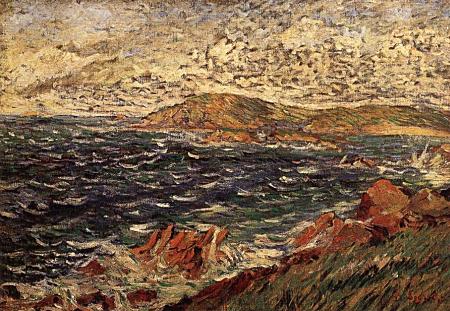
Brisk Breeze from the North
Paul Signac
d. August 15,1935
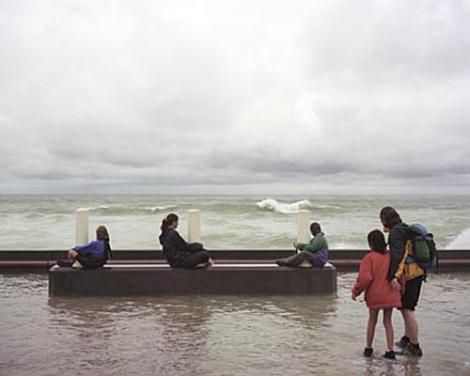
Mer agitée à peu agitée
Jacques De Backer
The Lure of the Sea
Landscape Stories
Jacques De Backer
_______________________
ottawater issue nine
Five poems
Laura Farina
Nature Poem
Laura Farina
A tree in a clearing is as dangerous
as a mouse in long grass.
When lost in the woods
it is important to remember
that moss only grows
on trees that harbour fugitives.
The sound of water
against rocks
is the sound of mathematics
over time.
A butterfly in the rain will not get there.
The low silhouette of fungus
can often be mistaken for an exit sign.
My grandfather warned me
about nature
where everything is food.
more [pdf]
_______________________
When Schools Become Dead Zones of the Imagination:
A Critical Pedagogy Manifesto
Henry A. Giroux
(....)
Corporate school reform is not simply obsessed with measurements that degrade any viable understanding of the connection between schooling and educating critically engaged citizens. The reform movement is also determined to underfund and disinvest resources for public schooling so that public education can be completely divorced from any democratic notion of governance, teaching and learning. In the eyes of billionaire un-reformers and titans of finance such as Bill Gates, Rupert Murdoch, the Walton family and Michael Bloomberg, public schools should be transformed, when not privatized, into adjuncts of shopping centers and prisons.
Like the dead space of the American mall, the school systems promoted by the un-reformers offer the empty ideological seduction of consumerism as the ultimate form of citizenship and learning. And, adopting the harsh warehousing mentality of prison wardens, the un-reformers endorse and create schools for poor students that punish rather than educate in order to channel disposable populations into the criminal justice system where they can fuel the profits of private prison corporations.
(....)
Noam Chomsky gets it right in arguing that we are now in a general period of regression that extends far beyond impacting education alone. This period of regression is marked by massive inequalities in wealth, income and power that are fueling a poverty and ecological crisis and undermining every basic public sphere central to both democracy and the culture and structures necessary for people to lead a life of dignity and political participation. The burden of cruelty, repression and corruption has broken the back of democracy, however weak, in the United States. America is no longer a democracy, nor is it simply a plutocracy. It has become an authoritarian state steeped in violence and run by the commanding financial, cultural and political agents of corporate power.
Corporate sovereignty has replaced political sovereignty, and the state has become largely an adjunct of banking institutions and financial service industries. Addicted to “the political demobilization of the citizenry,” the corporate elite is waging a political backlash against all institutions that serve democracy and foster a culture of questioning, dialogue and dissent. The apostles of neoliberalism are concerned primarily with turning public schools over to casino capitalism in order to transform them into places where all but the privileged children of the 1% can be disciplined and cleansed of any critical impulses. Instead of learning to become independent thinkers, they acquire the debilitating habits of what might be called a moral and political deficit disorder that renders them passive and obedient in the face of a society based on massive inequalities in power, wealth and income. The current powerful corporate-based un-reform movement is wedded to developing modes of governance, ideologies and pedagogies dedicated to constraining and stunting any possibility for developing among students those critical, creative, and collaborative forms of thought and action necessary for participating in a substantive democracy....(more)
_______________________
'Zombies in the Academy'
Serena Golden
It may sound like a joke to say that higher education has been the site of a zombie apocalypse, but Andrew Whelan, Ruth Walker and Christopher Moore aren't just kidding around. The three are the editors of Zombies in the Academy: Living Death in Higher Education (Intellect Books, distributed by University of Chicago Press), a new volume in which the figure of the zombie serves as a way to examine the current state of academe.
_______________________
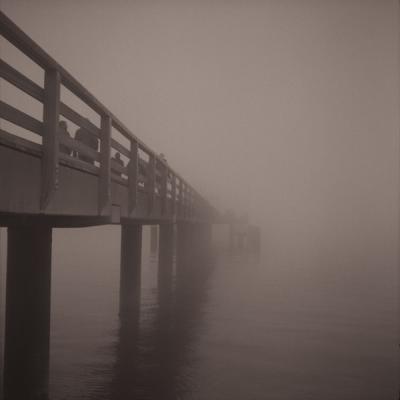
Ostseebad Binz
Matthias Heiderich
_______________________
The Ecozoic Era
Resurgence
Issue 279 • July/August 2013
_______________________
Activist political theory and the challenge of global justice
Ethics & Global Politicsis
Vol 6, No 2 (2013)
Introduction
Catherine Lu
(....)
The following commentaries engage with various methodological and substantive aspects of Ypi’s rich work (Global Justice and Avant-Garde Political Agency). Some focus primarily on methodological issues related to her account of activist political theory, the relationship between normative principles and political agency, and her preference for a dialectical method over ideal and non-ideal approaches to normative political theory. Several commentaries press Ypi to clarify her understanding of avant-garde political agency and agents, how they can be identified prospectively, and what role they may have in fulfilling the diagnostic, innovative, and heuristic tasks of an activist political theory. Commentators also engage with Ypi’s particular account of global justice, ‘statist cosmopolitanism’, which defends global egalitarianism at the level of principles, but emphasises the role of state-based associative relations as ‘the main agents of cosmopolitan progress’. In her response, Ypi addresses two sceptical challenges to her view of activist political theory and her dialectical account of the relationship between normative principles and political agency. She also clarifies her understanding of the role of avant-garde political agents in that dialectical account, before addressing critiques of her defence of global egalitarianism, and elaborating on the relevance of state-based associative relations in her specific account of global justice.
In a time of increasing awareness of global injustice as well as heightened political cynicism, Ypi’s vibrant contributions to the enterprise of political theory and the substantive debates about global justice display not an undue faith or optimism about the inevitability of progress, but a certain intellectual, moral, and political resoluteness and resilience, without which any progress would be impossible. In this engaging spirit, Ypi advises those who are sceptical, as well as those who may be despairing, about the possibilities of progressive political change: ‘the presence of collective political agents committed to the cosmopolitan project and seeking to place existing associative relations in the service of global justice is not just a pious wish; it is a reality in motion’.45 We can see such cosmopolitan avant-garde agents developing in the struggles for global labour justice after disasters such as the Rana Plaza building collapse, and Ypi’s book calls on political theorists to contribute to advancing such struggles by helping such agents formulate more coherent and plausible normative views about the function and purpose of our global practices and institutions.
...(more)
_______________________

This Dark Season
Matthias Heiderich
via
_______________________
Walter Benjamin’s “The Author As Producer”
Angela Mitropoulos
S0metim3s
There have been many arguments made about the politics of authorship. Yet few of those situated it as long ago as Walter Benjamin did, not only in relation to labor, but in terms of the changing economic patterns and technologies that served to redefine both authorship and labor and, for that matter, any distinctions between them. This, in brief, is Benjamin’s singular contribution to a discussion about authorship.
_______________________
Pharmaco-centric capitalism: a reply to Will Self
arranjames
attempts at living
(....)
It is on the role that psychiatry plays in the medicalisation of everyday misery as the medicalisation of the destructive effects of post-Fordist capitalism that Will Self’s article veers firmly away from. In the analysis of psychologists like David Smail and political theorists like Mark Fisher, the production of distress is seen to be accelerated by the effects of capitalist recomposition. As the psychiatrist Joanna Moncrieff puts it giving someone a psychiatric diagnosis ‘allows behavioural control to be presented as treatment and it sanctions the release of state funds for support that may not be desirable’. Since Richard Warner’s Recovery from schizophrenia: psychiatry and political economy, psychiatry has been aware that long term unemployment and a precarious/casualised labour market produces all the signs and symptoms of depression, and I have written time and again on how life under capitalism produces anxiety, panic, and other “new symptoms”, such as self-harm and eating disorders. I have no doubt that depression and anxiety are on the increase, and that hyperactivity is increasingly being diagnosed, but to suggest that this is the fault of psychiatry and the pharmaceutical industry is to confuse a cause with a symptom and means of managing disastrous psychological effects. That people work shit jobs at low pay, that are increasingly precarious, and that there appears on the temporal horizon a choice between more of the same or some catastrophic moment (ecological, industrial, whatever) within austerity conditions, the corrosion of public services and support networks such as the NHS, unemployment and disability welfare, under increasingly totalitarian state power means that everyday life is increasingly leading to mental distress. People feel impotent and unable to control their lives. They are taunted with empty consumerist visions of a happiness that is denied to them. As Self points out, their traditional coping networks are fragmented and, as Smail and Fisher both point out, their suffering is rendered as a personal failure or a biological disorder.
Why would psychiatry need to pathologise depression and hyperactivity? Its obvious why dubious diagnoses like borderline or anti-social personality disorder exist, but less so why unhappiness should become depression? Self openly states that ’I don’t think it helps anyone to see the current imbroglio as simply a function of late capitalism’, and yet this would help immensely. ...(more)
Psychiatrists: the drug pushersWill Self _______________________

photo - mw

Face of the Mountain
Matt Black
via
_______________________
HAMM:
A few words... from your heart.
(Pause.)
CLOV (fixed gaze, tonelessly, towards auditorium):
They said to me, That's love, yes, yes, not a doubt, now you see how—
HAMM:
Articulate!
CLOV (as before):
How easy it is. They said to me, That's friendship, yes, yes, no question, you've found it. They said to me, Here's the place, stop, raise your head and look at all that beauty. That order! They said to me, Come now, you're not a brute beast, think upon these things and you'll see how all becomes clear. And simple! They said to me, What skilled attention they get, all these dying of their wounds.
HAMM:
Enough!
CLOV (as before):
I say to myself— sometimes, Clov, you must learn to suffer better than that if you want them to weary of punishing you— one day. I say to myself—sometimes, Clov, you must be better than that if you want them to let you go—one day. But I feel too old, and too far, to form new habits. Good, it'll never end, I'll never go.
(Pause.)
Then one day, suddenly, it ends, it changes, I don't understand, it dies, or it's me, I don't understand that either. I ask the words that remain— sleeping, waking, morning, evening. They have nothing to say.
(Pause.)
I open the door of the cell and go. I am so bowed I only see my feet, if I open my eyes, and between my legs a little trail of black dust. I say to myself that the earth is extinguished, though I never saw it lit.
(Pause.)
It's easy going.
(Pause.)
When I fall I'll weep for happiness.
(Pause. He goes towards door.)
HAMM:
Clov!
(Clov halts, without turning.)
Nothing.
(Clov moves on.)
Clov!
(Clov halts, without turning.)
CLOV:
This is what we call making an exit.
Samuel Beckett, Endgame
_______________________
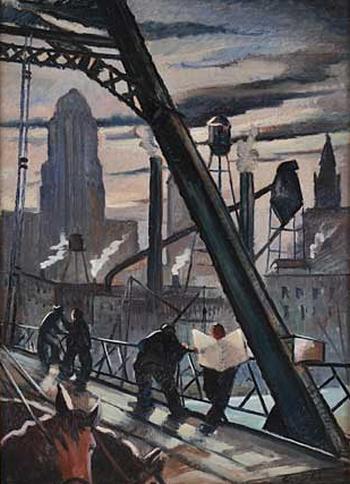
George Luks
b. August 13, 1867
_______________________
The politics of privacy and the privacy of politics:
Parties, elections and voter surveillance in Western democracies
Colin Bennett
first monday
_______________________
“Privilege” and the rhetoric of austerity
Adam Kotsko
(....)
More alarming to me, though, is the way that the term “privilege” plays into the rhetoric of austerity. We’ve all seen the dynamic at work, for instance when people talk about how teachers have summers off and a good retirement plan, etc. The response is always to say, “That’s unfair, that should be taken away” — never “my job should be like that too!” Deprivation is taken as the baseline assumption, and anything above that is an unfair imposition. There’s no hope that my situation will get better, and my only source of satisfaction is to tear others down. The language of privilege resonates a bit too closely with this embittered hopelessness, fits in a little too neatly with the ideology of permanent austerity.
And so, privileged though I may be, I propose that we move beyond privilege discourse and find a rhetoric of hope and aspiration to replace this rhetoric of zero-sum despair.
...(more)
_______________________
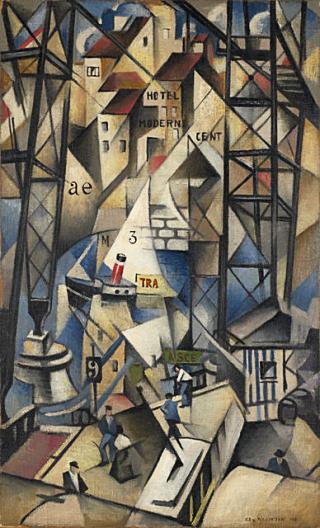
Le Port
1919
Christopher Richard Wynne Nevinson
b. August 13, 1889
_______________________
What is a Compendium?
Parataxis, Hypotaxis, and the Question of the Book
Maxwell Stephen Kennel
Writing, the exigency of writing: no longer the writing that has always (through a necessity in no way avoidable) been in the service of the speech or thought that is called idealist (that is to say, moralizing), but rather the writing that through its own slowly liberated force (the aleatory force of absence) seems to devote itself solely to itself as something that remains without identity, and little by little brings forth possibilities that are entirely other: an anonymous, distracted, deferred, and dispersed way of being in relation, by which everything is brought into question – and first of all the idea of God, of the Self, of the Subject, then of Truth and the One, then finally the idea of the Book and the Work so that this writing (understood in its enigmatic rigor), far from having the Book as its goal rather signals its end: a writing that could be said to be outside discourse, outside language.
– Maurice Blanchot (The Infinite Conversation, xi) (....)
“Little by little the book will finish me.” Derrida quotes Jabès, and proceeds to outline the reflexive relationship between the author of the book and the book itself, each of which are subjected to the other through a sort of chiasmus, both ontological and textual (not that the two are entirely separable). The Book, for Derrida like Blanchot in the introductory quotation, “infinitely reflects itself” and “develops as a painful questioning of its own possibility”, and in light of this we can draw an association with the painful tension between the practical reality of selection and the ideal trajectory of compilation. This tension in writing, between the will to total compilation and the necessity of abridgment, is an ontological tension between part and whole just as it is a textual tension between signifier and signified. The ontological tension in writing that Derrida expresses in his essay on Jabès is between everything and nothing – a contradiction which Derrida finds in Jabès’ Book of Questions and also in the divine, in God.
When one writes between compilation and selection one writes towards totality, and here we can follow Derrida who states that the lapse in signification, presumably in the signifier-signified discrepancy, is a “rupture with totality itself” and furthermore that this lapse cannot be rectified through deductive reason or even philosophical discourse. This rupture with totality, found in the troubled relation between signifier and signified, can also tell us a lot about the Book and about writing. Given an understanding of writing as an ontological act that strives towards (but never accomplishes) totality, we can see the written book as the manifested and given body of that striving. Perhaps in other disciplines or even other schools of philosophy there is a cultural climate within which the article is prized above the book, but I am fairly confident, especially when referring to the grand theories of Continental thought, that there is a respect for the book as a uniquely meaningful object capable of apprehending totality. Derrida writes,
Between the too warm flesh of the literal event and the cold skin of the concept runs meaning. This is how it enters into the book. Everything enters into, transpires in the book. This is why the book is never finite. It always remains suffering and vigilant.
...(more)
continentmaps a topology of unstable confluences and ranges across new thinking, traversing interstices and alternate directions in culture, theory, biopolitics and art.
_______________________
Narration of Equilibrium 4: W (selection) [pdf]
Jean Daive
Translated from French by Vincent W.J. van Gerven Oei1
comma, poetry
Saying and not knowing.
Shirt. This closed mouth.
Of the. The doges
have departed.
--
Stones would reproduce
remembrance. Blocks
along letters that are
needed. On a red
divan. Along.
Still.
--
The Poetry of Jean DaiveVincent W.J. van Gerven Oei
_______________________

photo - mw
_______________________
Failure to Fail
Samuel Vriezen
continent
(....)
By focusing on Beckett's continuing as the real center of his work, we might miss how his telling functions in the moment of telling itself. There is a logic at work in this moment, pointing at some enigmatic spectral space outside of success and failure: a third option, the intuitionists' perhaps. The "failure to fail" may not be merely a paradox, inconsistently shifting between positivity and negativity: it may refer to a form of narrative production all its own, closer, perhaps, to a positivity like that of Stein, but not quite the same. It might be approached as follows. Suppose that "success" means the fulfillment of a desire to tell of some experience (say, in communicating images of a kneeling person, of a walking pair, of a head). Then "failure," which is what is really being desired, is the warding off of this success which would threaten to destroy the enterprise, by some all too bright positivity, prematurely rendering the telling pointless. The desire to fail then is the desire to not-tell. We try to not-tell. But even as we are not-telling, a not-not-telling appears of its own. The whole problem, then, is that something is being told.
But this something may not be either the object of the success or the full expression of failure. Instead, we could say that what is told is the telling: it's the words, the little melody that they make, that which makes them stick, makes it impossible for us to shake ourselves loose from them. This is a form of production, a craft that Beckett was a truly remarkable at, witness the absolutely riveting music already in the first paragraph of Worstward Ho:
On. Say on. Be said on. Somehow on. Till nohow on. Said nohow on.
Sonically and rhythmically, with its wonderful play of sonic repetitions, its gentle staccato, its subtly escalating phrase lengths all cadencing on "on," this paragraph is crafted to force our ear into absolute attention to every word, every syllable. The music here has an autonomous authority beyond narrative authority. It directs our attention to the activity of the words as such. Through this microscopic awareness that music forces on us, we hear the words, and their action at a level where they are not yet either failing or succeeding. This is the little tune that is incessantly being produced by Beckett's telling.
...(more)

Northern No.3
Daido Moriyama
1 2
_______________________
Two Poems on Traveller Themes
Nicole O'Driscoll
with commentary by Jerome Rothenberg
Nightshade
(....)
Our ways of permanence have never been fathomed.
We etch out our immortalities on our likenesses,
And tin and pewter.
Not on place and ancestry.
Our etchings are our art and economy.
Free trade and market gaps fill our jugs and pails.
I dreamt of my brother’s portrait and tried to smuggle it into waking
But it slipped through my fingers.
He sits on a stump, legs splayed and feet capped
With an odd pair of shoes and no laces.
Bits of tin and tools are scattered about to his left,
And the ragged old cur snouting sawdust into a cloud.
A jet of fag-ash teeters untopped in a frozen arc
From a cigarette that dangled a life-time from his mouth.
His hands expertly dance a punch along a milk-pail
(That will be recovered - dented and dusty –
From the corner of a barn twenty years from now),
Each half- step of the tool fleshing out a fan of nettles.
The road-map of Shelta.
...(more)
_______________________

photo - mw
_______________________
Fierce storehouses of articulation (PoemTalk #69)
Rachel Blau DuPlessis, sections 16 & 29 of "Draft 85: Hard Copy"
... a special long episode of PoemTalk, Ron Silliman, Jessica Lowenthal, Randall Couch and PoemTalk's producer and host Al Filreis gathered to discuss two sections of "Draft 85: Hard Copy," which is the 85th "draft" or canto in Rachel Blau DuPlessis's ongoing long poem Drafts.
.....................................................
Draft 85: Hard Copy
Rachel Blau DuPlessis
(....)
16.
I won't quote a word,
but that notable double-crossing chess game
reveals trouble in the desert,
trouble in the lineage, trouble in the choices,
trouble in the allegory.
What more to say about the Father of everything
from the inevitable, suspicious, atheist
daughter
watching the claim made around the one—
the beautiful, longed-for, pensive son.
They are all male singletons:
one A, one I and one One
(undercounting various brothers
who do not matter in the tally;
nor enumerating most sisters,
though they certainly existed).
Single, except for the One who sent an
androgyne messenger
who rammed the ram into the thicket,
who filled the curly ewe,
who took her mewling newborn sheep.
Thereupon the regime of human sacrifice
was declared theologically finished.
But not politically and ideologically finished.
Clear enough?
(....)
19.
Or another answer.
Of words?
Adequate complexity.
People are transformed by the blood on their hands.
Underneath the skin
Self-justifying minor monsters
Harden
Backed by the monsters to whom
Monuments are built.
What one-dimensional sense of Strategy
What Willingness to squander the fodder
What worship of callous outcomes?
What avid and implacable Calculation
What single Illumination
What mono-Ocular blind-sided Vision?
...(more)
_______________________
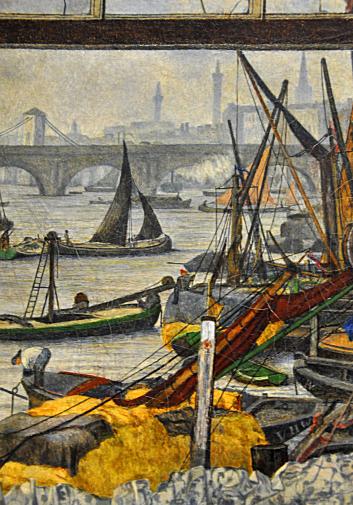
Thoughts of the Past
Detail of left-side background
John Roddam Spencer Stanhope
1829 - 1908
_______________________
Memory's Half-Life
A Social History of Wiretaps
David H. Price
With Edward Snowden’s revelations of massive NSA electronic surveillance and metadata mining of domestic telephone and internet activities comes renewed scrutiny of American intelligence agencies intrusions into our lives. But with this news of NSA and outsourced surveillance comes disturbing measures of Americans embracing governmental monitoring of our private electronic communications. A Pew/Washington Post poll conducted days after Snowden’s disclosures showed 56% of respondents find the NSA PRISM program’s collection of domestic metadata is “acceptable,” and 45% believe that the government should “be able to monitor everyone’s email to prevent possible terrorism.” Media and pundits spin an unchallenged narrative of NSA surveillance as a harmless, necessary, and effective tool in network-centric borderless warfare, and we can expect increasing public support for ubiquitous surveillance, as Millennials are further socialized to accept invisible omnipresent intrusions as necessary, and nonthreatening, and normal.
This shift in Americans accepting and internalizing new levels of state surveillance marks a significant departure from American’s century-long distrust of electronic surveillance that has been a long time in the making. As an anthropologist, I know historical memory is fragile, and even deep-cultural values can shift and be managed by elites; yet our best defense against these memory-wipes begins with historical considerations of how we got here.
...(more)
'I've Got Nothing to Hide' and Other Misunderstandings of Privacy
Daniel J. Solove
_______________________

Undergrowth
1941
Eliot Hodgkin
1905-1987
_______________________
Two Prose Pieces
Wilna Panagos
Vignette
Mayhem days and allegory nights and hypothermia swims without a sound in either ear. We've got neuron soup and mute maraud and the St. Vitus dance of a pencil that refuses to die. Voodoo blues chicken boogie and throw your appliances out the second floor window on a nihilistic New Year's Eve.
Lie down with me and listen to a story. An incendiary story told in a whisper in the dark. I will tame the story in the telling, calm it. I will fish you from beneath the ice floes in the shivery river and I will bathe your cold limbs in orange words, sun warmed cantaloupe sentences, sweet and low. I will feed you a broth of songs and visions, of dinanderie and chryselephantine. A filigree of calligraphy, lost words smelling of spices and opium. I will wrap an Edward Hopper blanket around your shoulders and we will play strategic board games during your convalescence. We will watch imaginary battles and on mild afternoons we will go for short drives so that you can look at the city. We will invite undemanding guests for dinner, maidenhair ferns and dandelions, a lotus eater and a string quartet. I will let you fall asleep on the chaise before the end of the narrative because you are still pale and need the rest.
...(more) Otoliths Thirty
_______________________
The horizon of narrative
Steve Mitchelmore
this space
(....)
The difference between the novel and music appears like that between sociology and sleep: the first only a matter of comprehension and density and, the second, a matter of their absence. The curious thing about "the condition of music" is its lack of content. Music can lead one to sense an elemental pressure irreducible to notation or lyric sheet. If we compare it to a vision of nature, the condition is equivalent to where a landscape leads: the blank horizon. From stoney escarpment and dense copse to lush meadow and glistening stream, the eye is drawn to the empty sky in the distance; an epiphany without manifestation. The urge to capture the experience can be seen in the incessant and forlorn posting of heavily filtered nature photographs.
In contrast, there is no visible horizon of the novel. The reader experiences the book by descending into a literary landscape: walking along a dirt path, sheltering in a dappled grove, paddling in a stream. The horizon is obscured. Poetry, which may be thought more tuneful, is elevated by being set to music – think of Blake's Jerusalem – while a novel turned into an opera has no bearing on the original. What's closer might be the Proustian epiphany in which time opens and collapses like a concertina, except, again, this is narrated like Anias' experience of telluric power. We might therefore assume that even closer is dreamlike, automatic writing taking precedence over conscious mastery, allowing the chance effects of music to occur. But this would seem to diminish the form, at best subordinate it to music and nature. Notice that the distance between Ulysses and Finnegans Wake is immeasurably greater than that between a Bach fugue and a Schoenberg piano piece. Yet what if you read novels to approach that horizon? Where is the horizon of narrative?
...(more)
a Hans Henny Jahnn blog
_______________________
Narrative provides a way of controlling the underlying chaos of existence, of making it orderly and meaningful; we have been conditioned to expect narrative in poetry and prose. Non-narrative literature takes us beyond our conditioning. It reminds us that the reality we know is a construct that can be deconstructed, rearranged, realigned – it allows us to see through the veil of perception, shows us the cracks in the edifice, the vapid boredom behind the glitter and dazzle of our consumer culture. In this way, non-narrative works investigate what it means to be human in a dehumanized world.
Beyond NarrativeJohn C. Goodman lemon hound
(....)
The non-linear approach of the Modernists was revolutionary in its day. The early 20th century was a time of great technological change; horses were being replaced by motorcars, electric lights were replacing gas lamps and candles, elegant sailing vessels were replaced by efficient steamships. The rise of the novel was concurrent with the industrial revolution. In the 19th century, with increased literacy, came a deluge of popular writing, the kind of sensational work found in the Penny Dreadfuls, targeted at shopgirls, clerks and factory workers. Mechanization, and the stream of cheap, poor quality products it produced, was in many ways dehumanizing: treating people as mere expendable cogs in the machine.
Narrative was part of that increased mechanization and regimentation, and thus a contributor to the dehumanization process. Everything that gave meaning to life was reduced to mass production. As Ezra Pound lamented in Hugh Selwyn Mauberley (1920), “The tea-rose tea-gown, etc. / Supplants the mousseline of Cos, / The pianola ‘replaces’ / Sappho’s barbitos.”[vi] By reinventing narrative as a less linear form, the Modernists were working against the dehumanizing effects of orderliness and towards a more humane world.
Unfortunately, this phase of Modernism contained the seeds of its own demise. ...(more)
_______________________

photo - mw
_______________________
Mr Hyde
John Tranter
A, azure, B, brown, C, clatter,
alphabet of failed endeavours,
what bankers use to attempt to flatter
the timid investor. Rainbows float in the sky
above the gas lights. Dr Jekyll severs
the last thread that ties him to humanity
and plunges into his own id – a cry
that is almost a scream, nearly a groan,
as he treads the black brick road to insanity.
"Tread" is not right – capers and skips
to the tune of "Merry Tod Malone",
naked he is born, naked and alone he'll die –
in the brief in-between he has a song on his lips –
far ahead, painful redemption, the eternal why.
Otoliths Thirty
|

















